Being part of a jury for a film festival is one of the most interesting and enjoyable parts of my job here at Short of the Week. Not only do you get to see the selections a film festival makes, but you get to discuss those shorts with fellow fans/experts and pick the titles that will get rewarded with a coveted award.
Over my years as Managing Editor of SotW, I’ve been lucky enough to sit on the juries of a variety of festivals and while every one has been a hugely rewarding experience, Manchester Animation Festival will always have a special place in my heart. The first animation-specific event I was involved with, the community feel and dedicated programming left quite the mark on me.
One of the elements of the festival that impressed me most was the team, a tight-knit bunch who seemed intent on being involved in every element of the event. With the festival’s latest edition starting very soon (Sun 12th Nov), Festival Director Steve Henderson joins us, as the latest guest in our Meet the Gatekeepers series, to discuss submission fees, what they look for in a selected short and becoming Oscar-qualifying.
So I’ve been lucky enough to attend Manchester Animation Festival and I know the great work you and your team put into the event, but for anyone who hasn’t been, can you tell us a bit about MAF and your role?
Manchester Animation Festival is the UK’s biggest animation event. We’ve been going since 2015 and we have an international screening competition with shorts, features, immersive films, which is at the core of everything that we do.
We have the short film competition, student films in competition, commercial films in competition, VR immersive, short films for children, and then we have an animated independent feature film competition as well. We also do workshops and masterclasses. In total, we have over 100 events at MAF this year.
THE BEST SHORT FILMS OF MAF2023 ON SHORTVERSE
We also have an academic conference, called the Animated Connections conference, which aims to bring together academics with training providers and industry to talk about the future of training and the development of the industry.
We also have the Animation Nation Forum, which used to be called Industry Day, and this allows businesses to come together to congregate around animation. We have some amazing speakers lined up for that as well, with talks about AI, the environment, and lots of other major issues that are facing the animation industry.
As for my role, I’m the festival director, which basically means that I just sit in front of emails all day and panic that things aren’t in order! But I do a lot of programming as well, to make sure that the festival provides what our audience expects. I think if I want to put it in a nutshell, I have to showcase animation in its best possible light. That’s effectively it.
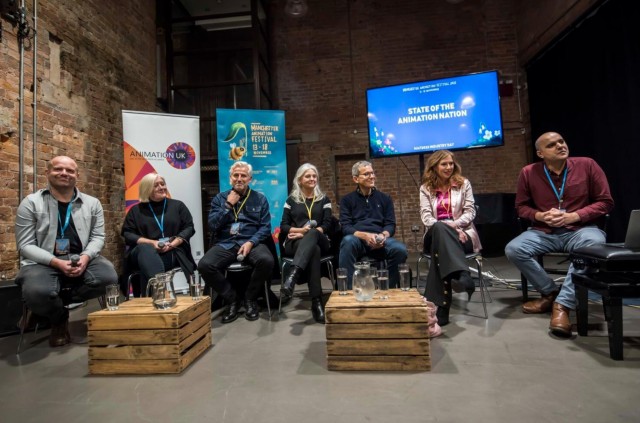
The State of the Animation Nation panel, part of the MAF2022 Industry Day. Steve Henderson (R)
Great and you mentioned your involvement in the programming there and it’s that programming that we’re really interested in talking about today. So lets start with your submission process, can you give us some insight into that? How do filmmakers submit? How many submissions do you get every year? Who’s involved in the screening? And who’s involved in putting together the final program?
Yeah, that’s a good question. On average, we get around 1000 submissions every year and this year we used FilmFreeway for the first time. If you submit your film to the festival, it will be viewed by our pre-selection committee, who will go through the films and select the ones that will go on to be viewed by our programming team.
The programming team is made up of myself, as festival director, Jen Hall, the ever encouraging and super organised powerhouse of the festival and co-founder along with Bill Lawrence and I, and Isabelle Croissant who works for HOME in Manchester. Isabelle’s been with us from from the very beginning. Isabelle acts as a kind of referee between me and Jen, but she’s also an amazing programmer in her own right. The three of us have this incredible shorthand between us, where we know what we all like.
“There’s so many heated debates and discussions around what makes it, and what doesn’t”
We joke about Isabelle being the referee because Jen and I are not only colleagues at Manchester Animation Festival, we’re a married couple and people might think that means we’re only showing films we both like, but Jen and I have very different tastes in film, and we surprise one another a lot with the films that we like and the films that we don’t like.
The final programme comes together over a series of weekends where we watch loads and loads of films together and try to figure out how we can best shape our programme. There’s so many heated debates and discussions around what makes it, and what doesn’t. It’s a challenge, but it’s also the fun part as well.
I know from speaking to you in the past how heavily involved you’ve always been in the screening process and I feel like that’s pretty that’s pretty rare for a festival director, especially so early on in the process. So what’s your what’s your motivation as festival director for being so hands-on at this stage.
It’s simple really. I love film, I love short film and I love watching them. It’s the best part of the festival, really. I just love the process, getting to see the ingenuity, the styles, the variety. I love everything about animated short films.
I know that other film festivals have contrasting definitions as to exactly what a director does, and each festival is different, but for us, with my background as a writer in animation and as an academic in animation, that naturally lends itself towards being a bit more hands-on with the selection of the films
“I love the screening process and watching the films with the selection team”
I don’t really know what a festival director is supposed to do, but I do know what the director of Manchester Animation Festival is supposed to do.
I love the screening process and watching the films with the selection team, I call it the fun bit. It’s the part of the festival that I absolutely adore, so why would I want to give that job to somebody else? Even if it is a lot of work.
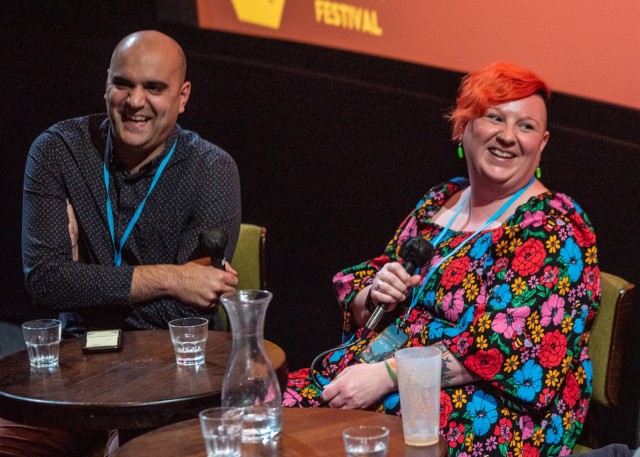
Steve Henderson (L) on a panel with Katie Bignell, Film Festival Strategist & Founder of Festival Formula
I think we obviously have a tendency to compare festivals to one another, but as you say, it’s easy to forget that each event is different and has its own aims and objectives. However, one area that is certainly comparable is the cost of a submission. One of the things that has always stood out about MAF is the affordable of the festival. Your submissions used to be free, but you’ve now started charging a very reasonable fee of between £5-£20 per submission. This is definitely cheap compared to a lot of other festivals, so how much thought did you put into those submission fees and how did you come to those costs?
This is the first year that we have charged for submissions, as since 2015 submissions have been free. The reason that they’ve been free is because we wanted to provide access to as many people as possible. That was a great success because a lot of animated short films don’t really have the budget for submitting to film festivals, so when they come up against a prohibitively expensive festival, which might charge upwards of £100 to submit their work, that’s a roadblock and it stops that film being seen.
We looked at the prices and we thought, let’s test this out, let’s see if we get the same amount of films if we charge a small fee. The money wasn’t a motivation, we were interested in the quality of the work coming through and whether it remained the same as previous years. We were delighted to see that we had the same number of films this year as we did the year before and the quality of films remained the same as well.
“By paying a submission fee you’re helping to kick-start a festival”
So switching to FilmFreeway and switching to charging didn’t really make much of a difference. The only difference it made for us, was that it gave us a little bit of extra cash to play with during the year, which effectively helped us start the festival earlier and hire more people. Filmmakers often, and you could say rightly, get upset when film festivals take their money from them and don’t select their film for the festival. But, I think it’s important to realise that by paying a submission fee you’re helping to kick-start a festival. You’re giving them money to help them get started on that event as that’s where that money is going.
The main reason we were free was because we looked at other animation festivals, like Annecy, and they were free, so we we thought we should be free as well. However, the main difference between MAF and some of these other large animation festivals on the continent is that they have the support of local, regional and national institutions and councils and we’re not really at that position yet. We haven’t been established as long, so we don’t have that kind of support, yet.
Charging for submissions was a difficult decision to make, but we’re glad we made it and we’re glad that the filmmaking community embraced it as well. As for keeping the fee low, we had a lot of discussions about this and realised that if we put it on FilmFreeway for free, then we would attract lots of filmmakers that would submit without any real consideration. However, if you put a price on there, it forces people to consider their submissions.
However, we wanted to ensure a low entry point because, as I said earlier on, you’ve got people that might not necessarily have the budget and we want the festival to be as accessible as possible. Access is key. If we put a ridiculous price on there, that certainly wouldn’t be the case and we really don’t want to be that festival.
That’s refreshing to hear that you started charging and the filmmakers still submitted. I think, in general, filmmakers tend to understand that there is a cost that comes with running a festival or an online platform and these fees are important to help cover the running costs.
So in terms of finding films for Manchester Animation Festival, do you look outside of submissions system for shorts you want to programme?
We might come to a point during submissions where we’ll say, “Oh, has this film that we adored when we saw it at Annecy being submitted yet?” We don’t actively hunt, but there are certain films that we would like to be able to consider and there are times where I’ll encourage people to submit their work, providing them with a waiver code, and then we end up not selecting the film.
I feel a tremendous amount of guilt when that happens, because I’ve wasted somebody’s time and maybe put their hopes up by asking them to submit their film. However, between the pre-selectors and the actual selection committee, the three of us, we all have these incredible conversations to make sure that what ends up on the screen is right for the festival and sometimes those films just aren’t right.
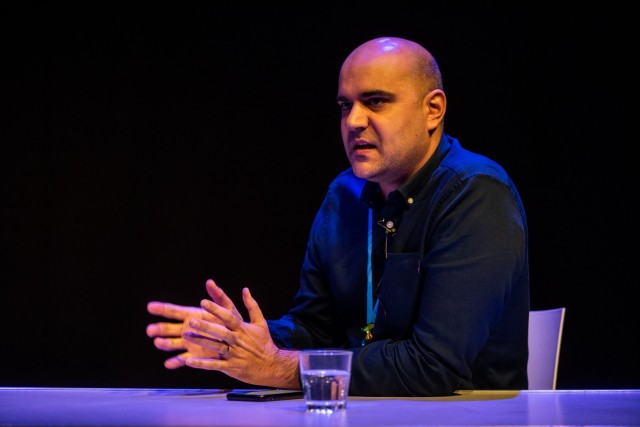
Steve taking part in the discussions at Manchester Animation Festival
It’s got to be a team decision. That’s the same at SotW. Sometimes, I’ll see a film at a festival and love it, but when I bring it back to the team for discussing, the general consensus is that it’s not right for our platform. It can feel like you’ve somewhat misled a filmmaker, but ultimately, it’s about doing what’s right for your curation.
With that in mind, do you have certain criteria that each selected film must meet? I know it can be hard to boil this down into easily sharable information, but what are the things that you’re looking for in a MAF selection?
Another good question and one that I feel we get asked a lot, essentially what you’re asking is – how do I get my film screened at Manchester Animation Festival? In response, we always tell people we have no idea how to get your film screened at Manchester Animation Festival, but we do know how not to get your film screened at Manchester Animation Festival.
We have a list of things that look out for and that we share with who ask this question – particularly with students. So if you want your film to be in with a chance of being screened at Manchester Animation Festival, you need to avoid the following pitfalls:
- You need to make sure that your sound and foley is up to scratch. By that, we mean, making sure that the music is unique and it’s not the same music that you hear on all the royalty free sites. For foley, if you can make your own, please do. As there’s only so many times I can hear the same lightning strike when I’m looking at films back to back.
- When it comes to voice performances, your mate in the pub might be hilarious when he’s got pint in his hand, but when you put him in front of the microphone, he might freeze up. So get a professional voiceover artist if you have spoken dialogue in your film, make sure that they’re a professional actor.
- Be original, we don’t like to see things that have been done before. We know everyone’s absolutely delighted with the style of the Spider-Verse, or the Teenage Mutant Ninja Turtles or whatever’s popular at the moment, but we don’t need to see lots of films echoing that style. Don’t show us something that’s been done before, show us something new.
- Say something new. There are only a limited amount of subjects that you as a filmmaker can discuss, but only you as a filmmaker can tell them in a unique way and that’s what we’re looking for at MAF. Don’t remake a film, make your own.
- We don’t like overly long films. We’re trying to show as much variety as possible at MAF, so a sweet spot is somewhere between three to five minutes for our animation festival. Because if you’ve got a six-minute film, it needs to be as good as two three-minute films and if you’ve got a 12-minute film, it needs to be as good as four three-minute-long films.
- Don’t show me everything. Now, this is something that student films sometimes fall into, where they spend incredible amounts of time crafting sets and characters and then they’ll take forever panning through all this detail, so you’re a minute and a half in before you even get to the title. That’s a big no-no, in a short you need to get into the story as soon as you possibly can.
To sum it up, we’re looking for films with soul. We don’t know what it is, but we know it when we see it.
A History of Maf in Previous Award Winners
- Pachyderme (Best Short Film, 2022)
- Night of The Living Dread (Audience Award, 2021)
- Save Ralph (Best Commissioned Film, 2021)
- The Great Malaise (Best Short Film, 2020)
- Girl in the Hallway (Best Short Film, 2019)
- Bloeistraat 11 (Best Short Film, 2018)
- Facing It (Audience Award, 2018)
- Manivald (Best Short Film, 2017)
- Grandpa Walrus (Audience Award, 2017)
- Mr Madila (Audience Award, 2016)
- Edmond (Best Student Film, 2015)
- MANOMAN (Audience Award, 2015)
Perfectly put. I’ve spoken to a few people about this now and of course it’s different for every festival, but I do think what it boils down to is some kind of originality. Like you say, if you’re doing a story that’s really important to you, that’s great, but you need to think about whether you can bring something new to that story.
Exactly, and I want to take you back to that selection room as well. Keeping in mind the title of this interview series, Meet the Gatekeepers, we don’t feel like gatekeepers. The hardest decision isn’t what we let in, the hardest decision is what we’re not playing, because there are so many heartbreaking choices we have to make.
“The films that end up in the programme selection are the survivors of a very bloody battle”
Often we’ll make these calls and then we’ll end up going to another festival and see that film on the big screen and realise, “ah, it’s the one that got away”. We decided that we wanted to play something instead, which we still loved, and we wouldn’t have had it any other way.
But, people tend to think that it’s easy for festival programmers to select films, like they’re doing a movie night or something and it’s not that at all. There’s a lot of consideration that goes into it and it’s more difficult to let a film go than it is to select it. In many respects, the films that end up in the programme selection are the survivors of a very bloody battle.
So true. There are a lot of things you have to take into consideration when you’re programming films, it’s not just a case of whether a film is good enough for a festival. Duration can be a deciding factor and that brings us nicely on to our next question – in terms of in terms of restrictions on what you accept for MAF, what do you have in place?
Let’s start with duration. Is there a maximum length for a short film at MAF? I know you said you prefer short films, but is there a cutoff point.
Yeah, we have a cutoff point with our films and it’s 30 minutes, because otherwise, you can just ending up showing two films in a screening.
This is a really interesting subject though, because we’re having a panel at this year’s festival called How it works: Film Festivals where our very own Jen Hall and Isabelle Croissant will be joined by Aneta Ozorek, the Artistic Director of Kaboom Animation Festival in the Netherlands and Ornela Čop the festival coordinator of Animafest Zagreb in Croatia, to talk about the selection process and the consideration that goes into this. Effectively, we’ve stolen Meet the Gatekeepers without wanting to, but we’re having this panel to talk about those issues.
“The screen is real estate and there’s only so much space”
And one of the issues is the fact that short films are getting longer and longer. We had so many 30-minute short films submitted this year, that we really had to wrestle with whether we wanted to show that film or show a few others. The screen is real estate and there’s only so much space.
How many of those 30-minute films actually make it into the programme? What’s the longest short film you’ve got screening this year?
The longest one goes right up to the wire goes up to 30 minutes and that’s A Bear Named Wojtek by Iain Gardner. We’re also screening Peter and the Wolf from Blink Industries, directed by Elliot Dear and Stephen McNally (Meanwhile, Forgot), which is another 30-minute film. They’re the long ones this year.
I’ve seen festivals in the past do a long shorts program, which I thought was quite an ingenious solution to that, because it gives the other screenings rooms to breathe. There’s a lot of longer shorts being made recently and festivals have to react to that.
Definitely, and in terms of your short film blocks, how long do they usually run?
About 75 minutes. We get to about an hour and 15, around that length, and we think that’s a good amount of time. There’s the old Alfred Hitchcock quote: “The length of a film should be directly related to the endurance of the human bladder”. I think that’s the goal. In an hour and 15, for a short film program, you still get to see a huge variety of work and explore different worlds and spaces.
Great. And how are the short films in a screening linked? Is there an overarching theme that draws them together?
For our competition, they’re not themed. Jen changed the name of our short films in competition screenings to the Animation Mixtape, because that’s the kind of vibe we want to get across, the variety. They’re a showcase of what’s happening in animation at this current time.
However, we do separate out of competition screenings and this year we’re delighted to be able to showcase African films in our Animated Africa screening, which was curated by Dr. Mohamed Ghazala. We’ve also got a trans voices screening, called Divert, Delight, Defy: Animating Trans Identities curated by Al Hart. Al has been a real core member of the festival team since they came as a punter in 2016 and have worked their way up, from a volunteer. So, now to be able to hand the reins of a screening over to Al and let them curate the films is one of the privileges of being a festival director, being able to give people space to shine.
That’s a lovely thing to do, to welcome someone new into the programming sphere, as it’s one of those areas where it’s hard to get experience.
Well you’ve got to do it because otherwise it’ll just be a load of old blokes doing it and they’ll all die and no one will know how to do it anymore
Hahaha – well I’m quickly becoming one of the old men, so it’s great to see a new generation of programmers coming through.
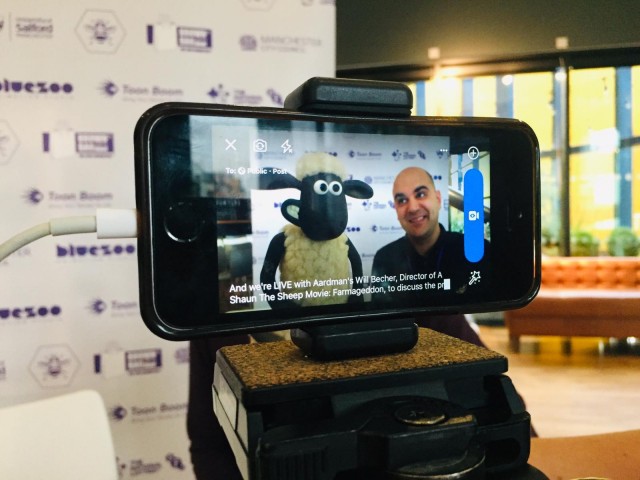
Steve getting to meet one of his heroes at a previous edition of MAF
One of the things I’ve always liked about the MAF line-up is the fact that you get what we’d describe as these “bigger festival films” rubbing shoulders with the work of emerging filmmakers, who are trying to get their voice heard and their work seen. How important is it for Manchester Animation Festival to be supporting the emerging filmmaker like this?
I think it’s essential, I really do. It’s also an absolute pleasure watching filmmakers who come with a short film in the festival, grow into more established, well-respected filmmakers over the years. That’s one of the great pleasures of programming, really, when you see a spark and want to help to showcase it.
I think it’s really important that we put these people alongside the big hitters, you know, the Disney or Netflix guests, and let them share the same spotlight. When you mention animation, the layperson might instantly think of The Minions or family blockbusters, and they’re great but in reality there’s a huge landscape, which Short the Week and festivals around the world do their best to screen.
“We like to bring those worlds together”
I think it’s really important that we’re able to do that as a festival. If people come to MAF to see Disney give a talk, we like to think that they’re going into a screening as well and seeing something they’ve never seen before and expanding their understanding of animation. And likewise, if somebody is going in to see a short film screening, because they’re a short film aficionado, they might go and see the making of Chicken Run and be blown away by the process. That’s what we like to do, we like to bring those worlds together.
It really is a great experience for those emerging filmmakers to be able to come to a festival, have their film shown and rub shoulders with some of animation’s “bigger” names. I know when I’ve been at MAF I’ve been a little surprised by some of the people I’ve got to hang out with.
That’s always a great thing, meeting those filmmakers as well, particularly in animation, where they’re the nicest people going. You can meet someone like Joanna Quinn, an Oscar nominee a couple of years ago, as she’s one of the nicest people working in animation and is so accessible and kind. The animation world is just full of lovely people.
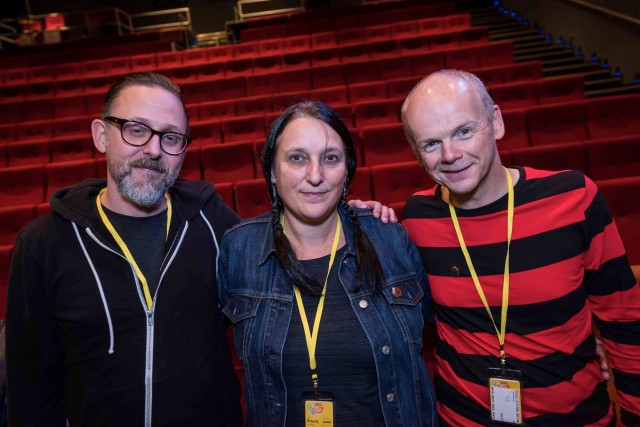
Short of the Week’s Rob Munday (L) as part of the Manchester Animation Festival Jury in 2018.
Since you mentioned the Oscars, that brings us into a perfect segue for our next question, as MAF became Academy Award Qualifying this year. Firstly, congratulations on that, it’s great news. I’m interested to know what this recognition means for the festival and does it bring any added pressure with it?
No, I don’t think it brings any added pressure because we’ve worked towards it for many years and you have to have had a prestigious list of jurors over the years – some of them, but not all of them, called Rob Munday. Once you have the Academy status, you’re already doing the job you just need to keep doing that job, and you’ve got nothing to worry about really.
The pressure’s on in terms of . . . I don’t know . . . the pressure isn’t on! Sorry, Rob!
I mean, it’s a tremendous privilege to be recognised by the Academy especially as the UK’s only animation festival with this recognition. In total, I think there are only six events in the entire UK that are academy qualifying for this, including BAFTA. So we’re in a very prestigious list there and it’s an honour to stand alongside these other incredible qualifying festivals that have been going for years and years.
It’s also great to be able to help some of those more independent productions get recognised for the Academy Award, as in the past the Best Animated Short Film award has been one dominated by the larger studios.
Absolutely and along those lines, we currently have one award currently which has been recognised by the Academy but we’ve now established a British Animated Short Award and hope that in future years that might be recognised by the Academy as well. Then, there’ll be more British films taking that shortcut to the Oscars.
Exciting times! And that talk of the future leads us into another perfect segue for our final question, what does the future for Manchester Animation Festival look like? Do you have any big aims or plans for the event?
II think it’s really important that we keep on with our mission to ensure that animation is accessible for as many people as possible and that we’re able to exist as a platform for emerging and established talent. We say we like to bring the world of animation to Manchester and share Manchester animation with the world and that’s exactly what we like to try and do with the festival.
“The competition programme is always going to be key”
At the core of what we do, no matter how big we grow, how many venues we take over, the core of what we do will always come back down to me, Jen and Isabelle in that room, and the people in the pre-selection committee, coming up with a really solid competition programme. That’s always going to be the core of everything we do as a festival, the competition programme is always going to be key.
It would be very easy to give way to commercial aspirations, but at the end of the day, you’ve got to remember that our festival is all about animation. It’s right there in the title. So as long as we can showcase the best animation in the world and share that with as many people as possible, then we’ll be very happy indeed.
 Rob Munday
Rob Munday